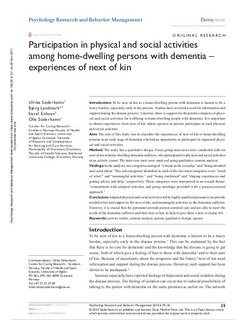Participation in physical and social activities among home-dwelling persons with dementia - experiences of next of kin
Journal article, Peer reviewed
Published version
Permanent lenke
http://hdl.handle.net/11250/2473522Utgivelsesdato
2013Metadata
Vis full innførselSamlinger
Sammendrag
Introduction: To be next of kin to a home-dwelling person with dementia is known to be a heavy burden, especially early in the process. Studies have revealed a need for information and support during the disease process. Likewise, there is support for the positive impacts of physical and social activities for wellbeing in home-dwelling people with dementia. It is important to obtain experiences from next of kin whose spouses or parents participate in such physical and social activities. Aim: The aim of this study was to elucidate experiences of next of kin to home-dwelling persons in an early stage of dementia who had an opportunity to participate in organized physical and social activities. Method: The study has a qualitative design. Focus group interviews were conducted with ten next of kin to home-dwelling dementia sufferers, who participated in physical and social activities in an activity center. The interview texts were analyzed using qualitative content analysis. Findings: In the analysis, two categories emerged: “a break in the everyday” and “being attended and cared about.” Two sub-categories identified in each of the two main categories were: “need of relief” and “meaningful activities;” and “being confirmed” and “sharing experiences and getting advice and help,” respectively. These categories were interpreted in an overall theme: “contentment with adapted activities and group meetings provided with a person-centered approach.” Conclusion: Adapted physical and social activities led by highly qualified personnel can provide a needed relief and support to the next of kin and meaningful activities to the dementia sufferers. However, it is crucial that the personnel provide person-centered care and are able to meet the needs of the dementia sufferers and their next of kin, to help to give them a new everyday life. Key words: activity center, content analysis, parent, qualitative design, spouse

